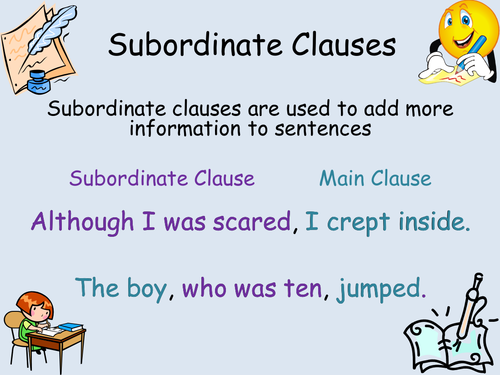As elements in sentence structure, subordinate clauses most commonly function as adjuncts. They may also have the following functions:
1 Subject:
What you need is a long holiday. nominal relative
Leaving home can be very traumatic. -ing clause
To give up now would be such a pity. to-clause
That he should fail to turn up is really that-clause
annoying.
With the exception of nominal relatives and -ing clauses,
clauses functioning as subjects are rare. The -ed type (Dressed
in armour . . . ) cannot function as a subject.
2 Direct object :
Paul knows that Amy prefers tennis. that-clause
Jim offered to drive us to the airport. to-clause
Mary enjoys visiting art galleries. -ing clause
We still don’t know what will happen. nominal relative
3 Subject complement :
A detective’s first job is to collect the evidence. to-clause
The main problem is finding enough money. -ing clause
The real reason is that I can’t stand him. that-clause
That’s what I’m trying to tell you. nominal relative

1 Subject:
What you need is a long holiday. nominal relative
Leaving home can be very traumatic. -ing clause
To give up now would be such a pity. to-clause
That he should fail to turn up is really that-clause
annoying.
With the exception of nominal relatives and -ing clauses,
clauses functioning as subjects are rare. The -ed type (Dressed
in armour . . . ) cannot function as a subject.
2 Direct object :
Paul knows that Amy prefers tennis. that-clause
Jim offered to drive us to the airport. to-clause
Mary enjoys visiting art galleries. -ing clause
We still don’t know what will happen. nominal relative
3 Subject complement :
A detective’s first job is to collect the evidence. to-clause
The main problem is finding enough money. -ing clause
The real reason is that I can’t stand him. that-clause
That’s what I’m trying to tell you. nominal relative
